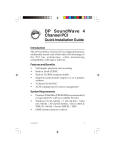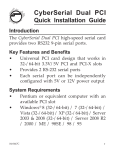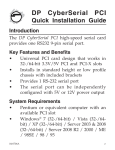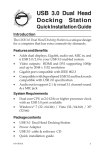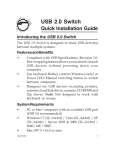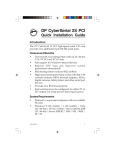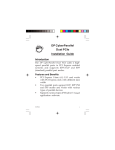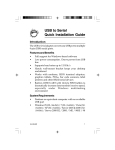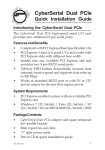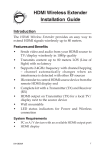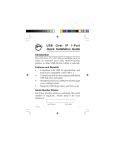Download SIIG 5 Installation guide
Transcript
USB 2.0 to VGA Quick Installation Guide Introduction The USB 2.0 to VGA allows you to connect an additional display to your desktop or notebook PC and use it as an extended desktop or as an additional larger/different display for your main screen. Features and Benefits • • • • Compliant with USB specification, Rev.2.0 Supports suspend and wake-up modes Functionality: primary, extended and mirror Resolution: up to 1680x1050 @ 32-bit color Serial Number Sticker For future product return or exchange, this serial number is required. Please keep it for your reference. Serial Number 04-0473I Part Number 1 System Requirements • • • Pentium® 4 1.5GHz or equivalent PC An available USB 2.0 port Windows® 8 (32-/64-bit) / 7 (32-/64-bit) / Vista (32-/64-bit) / XP (32-/64-bit) / Server 2003 & 2008 (32-/64-bit) / Server 2008 R2 / 2000 Package Contents • • • USB 2.0 to VGA Driver CD Quick installation guide Layout VGA port USB port Figure 1: USB 2.0 to VGA 2 Installation Make sure the proper version driver for your graphics card is installed, the USB to VGA is not designed to work with Windows' Standard VGA Graphics Adapter driver. Warning: DO NOT plug the USB 2.0 to VGA adapter into your computer's USB port until you are instructed to do so. The driver installation will fail when the adapter is plugged in prematurely. Windows 8 (32-/64-bit) / 7 (32-/64-bit) 1. 2. 3. 4. 5. Insert the driver CD, close the CD autoplay box if prompted. Press the Windows key and R, type D:\setup.exe, press Enter. (Change D: to match your CD/DVD-ROM drive letter) At User Account Controls, click Yes. Click Next, select I accept the terms of the license agreement, click Next. The install wizard will copy the drivers and configure your system. Do not interrupt this process. 3 6. 7. 8. Select Yes, I want to restart my computer now, then click Finish. This step could take several minutes to appear. While Windows is restarting, connect your second monitor to the USB 2.0 to VGA and turn it on. When Windows resumes, plug the USB 2.0 to VGA into the computer, the driver will install automatically. Windows Vista (32-/64-bit) 1. 2. 3. 4. 5. 4 Insert the driver CD. At the AutoPlay box: Double click Setup. If AutoPlay doesn't start: Click Start, in the Start Search box, type D:\setup.exe, press Enter. (Change D: to match your CD/DVD-ROM drive letter) Click Continue. Click Next, select I accept the terms of the license agreement, click Next. Click Install up to three times. Click Finish. Connect your second monitor to the USB 2.0 to VGA and turn it on. 6. 7. Plug the USB 2.0 to VGA into the computer, the driver will install automatically. Restart Windows to complete installation. Windows XP (32-/64-bit) / Server 2003 (32-/64-bit) 1. 2. 3. 4. 5. 6. 7. 8. 9. Insert the driver CD. Click Start, then Run. Type D:\setup.exe, click OK. (Change D: to match your CD/DVD-ROM drive letter) Click Next, select I accept the terms of the license agreement, then click Next. Click Continue Anyway up to three times. At InstallShield Wizard Complete, click Finish. Connect your second monitor to the USB 2.0 to VGA and turn it on. Then plug the USB 2.0 to VGA into the computer. Select No, not this time, then click Next. Skip this step if not prompted. Select Install the Software Automatically, then click Next. Click Continue Anyway. Skip this step if not prompted. Click Finish, and restart Windows. 5 Windows Server 2008 (32-/64-bit) 1. 2. 3. 4. 5. 6. 7. Insert the driver CD. At the AutoPlay box: Double click Setup. If AutoPlay doesn't start: Click Start, in the Start Search box, type D:\setup.exe, press Enter. (Change D: to match your CD/DVD-ROM drive letter) Click Next, select I accept the terms of the license agreement, click Next. Click Install up to 3 times. Skip this step if not prompted. Click Finish. Connect your second monitor to the USB 2.0 to VGA and turn it on. Plug the USB 2.0 to VGA into the computer, the driver will install automatically. Wait several seconds, then restart Windows to complete the installation. Windows Server 2008 R2 1. 6 Insert the driver CD. At the AutoPlay box: Click Open folder to view files, then double click Setup. 2. 3. 4. 5. If AutoPlay doesn't start: Click Start, in the Search programs and files box, type D:\setup.exe, press Enter. (Change D: to match your CD/DVD-ROM drive letter) Click Next, select I accept the terms of the license agreement, click Next. Select Yes, I want to restart my computer now, then click Finish. While Windows is restarting, connect your second monitor to the USB 2.0 to VGA and turn it on. When Windows resumes, plug the USB 2.0 to VGA into the computer and the driver will install automatically. Windows 2000 Important: Go to SIIG's website and download the Windows 2000 driver at the link provided below. Then follow the steps to install the driver. HTTP://www.siig.com/media/files/drivers/ 0009/setup.exe 1. After saving the downloaded file to your system, double click on the setup.exe to start the driver installation. 7 2. 3. 4. 5. Click Next, select I accept the terms of the license agreement, click Next, then click Finish. Connect your second monitor to the USB 2.0 to VGA and turn it on. Plug the USB 2.0 to VGA to the computer and the drivers will install automatically. Restart Windows to complete the installation. To Verify Installation 1. 2. 8 From the desktop, right click Computer or My Computer, then click Manage. For Windows 8 / 7 / XP / 2003 / 2000: Click Device Manager. For Windows Vista: Click Continue, then click Device Manager. For Windows Server 2008 / 2008 R2: Double click Diagnostics, then click Device Manager. Double click Universal Serial Bus controllers, USB Display Device (T1P) should be displayed. Display Utility After successful driver installation either Super Utility and/or USB Display Device icon will appear in the taskbar by the system clock. This utility allows you to change the viewing modes and resolutions for the USB 2.0 to VGA. Windows 8 / 7 / Server 2008 R2 Access the utility by right clicking on the Super Utility icon located on the taskbar by the clock. Display Settings • Duplicate these displays: In this setting, the USB 2.0 to VGA will mirror your desktop. You will see the same image on both displays. • Extend these displays: This setting extends your desktop for easy viewing of multiple windows. Windows will move off the primary display and enter the extended display. NOTE: To match the physical arrangement of your displays, drag the monitor icons into the appropriate position. See Figure 2. 9 Figure 2 • Make this my main display: This setting is active when using your monitors in extended mode only. Before selecting this option, enable Auto Arrange* (right click anywhere on the desktop, click View, click Auto Arrange) to allow your desktop icons to move to the new main display. *Warning: If you do not enable Auto Arrange, you will need to drag-n-drop your desktop icons to the new main display. • • 10 Show desktop only on 1: This setting turns on display 1 and turns off all other displays Show desktop only on 2: This setting turns on display 2 and turns off all other displays Vista / XP / 2003 / 2008 / 2000 (USB Display Device) Access the utility by right clicking on the Super Utility or USB Display Device icon located on the taskbar by the clock. (USB Display Device is recommended.) Viewing Modes • Mirror: In this mode, the USB 2.0 to VGA will mirror your desktop. You will see the same image on both displays • Extended: This mode extends your desktop for easy viewing of multiple windows. Windows will move off the primary display and enter the extended display. To match the physical arrangement of your displays go to Monitor Orientation on page 13 for more information. • Off: This setting turns off the USB 2.0 to VGA adapter • Primary: This mode, makes the USB 2.0 to VGA the main display adapter in the system, and the system's main display will be the extended display*. 11 *NOTE: For systems with the main display turned off, go to Display Settings. Select the main display (#1) and check Extend the desktop onto this monitor. See Figure 3 below. Figure 3 12 Monitor Orientation To open this window, right click the USB Display Device icon, then click Display Settings. Drag the monitor icons to match the physical arrangement of your monitor (In Windows 2000 click the Settings tab to display this screen). See Figure 4. Note: This feature is disabled when your monitors are in Mirror mode. Figure 4 13 Frequently Asked Questions Q1: Why won't my DVD video play when I move it over to the extended display? A1: Some DVD playback software packages do not support playing on a secondary display adapter. This is a limitation of the DVD playback software. Q2: There are lines running up and down my screen or the screen is distorted A2: This is due to a low or unsupported refresh rate. Make sure you select the USB 2.0 to VGA and not set the refresh rate higher than what your monitor can support. Q3: How do I move a Window to the extended display? A3: When a window is Maximized it can not be moved to the extended display. Click on the Restore Down button located in the upper right hand corner of the window to the left of the Close button. To move the window, place the mouse cursor over the title bar, hold down the left mouse button and drag the window to the other screen. 14 Technical Support and Warranty QUESTIONS? SIIG’s Online Support has answers! Simply visit our web site at www.siig.com and click Support. Our online support database is updated daily with new drivers and solutions. Answers to your questions could be just a few clicks away. You can also submit questions online and a technical support analyst will promptly respond. SIIG offers a 5-year manufacturer warranty with this product. This warranty covers the original purchaser and guarantees the product to be free of any defects in materials or workmanship for five (5) years from the date of purchase of the product. SIIG will, at our discretion, repair or replace (with an identical product or product having similar features and functionality) the product if defective in materials or workmanship. This warranty gives you specific legal rights, and you may also have other rights which vary from state to state. Please see our web site for more warranty details. If you encounter any problems with this product, please follow the procedures below. A) If it is within the store's return policy period, please return the product to the store where you purchased from. B) If your purchase has passed the store's return policy period, please follow the steps below to have the product repaired or replaced. Step 1: Submit your RMA request. Go to www.siig.com, click Support, then REQUEST A PRODUCT REPLACEMENT to submit a request to SIIG RMA or fax a request to 510-657-5962. Your RMA request will be processed, if the product is determined to be defective, an RMA number will be issued. Step 2: After obtaining an RMA number, ship the product. • Properly pack the product for shipping. All accessories that came with the original package must be included. • Clearly write your RMA number on the top of the returned package. SIIG will refuse to accept any shipping package, and will not be responsible for a product returned without an RMA number posted on the outside of the shipping carton. • You are responsible for the cost of shipping to SIIG. Ship the product to the following address: SIIG, Inc. 6078 Stewart Avenue Fremont, CA 94538-3152, USA RMA #: • SIIG will ship the repaired or replaced product via Ground in the U.S. and International Economy outside of the U.S. at no cost to the customer. 15 About SIIG, Inc. Founded in 1985, SIIG, Inc. is a leading manufacturer of IT connectivity solutions (including Serial ATA and Ultra ATA Controllers, FireWire, USB, and legacy I/O adapters) that bridge the connection between Desktop/Notebook systems and external peripherals. SIIG continues to grow by adding A/V and Digital Signage connectivity solutions to our extensive portfolio. SIIG products offer comprehensive user manuals, many user-friendly features, and are backed by an extensive manufacturer warranty. High quality control standards are evident by the overall ease of installation and compatibility of our products, as well as one of the lowest defective return rates in the industry. SIIG products can be found in computer retail stores, mail order catalogs, through major distributors, system integrators, and VARs in the Americas and the UK, and through e-commerce sites. PRODUCT NAME USB 2.0 to VGA FCC RULES: TESTED TO COMPLY WITH FCC PART 15, CLASS B OPERATING ENVIRONMENT: FOR HOME OR OFFICE USE FCC COMPLIANCE STATEMENT: This device complies with part 15 of the FCC Rules. Operation is subject to the following two conditions: (1) This device may not cause harmful interference, and (2) this device must accept any interference received, including interference that may cause undesired operation. THE PARTY RESPONSIBLE FOR PRODUCT COMPLIANCE SIIG, Inc. 6078 Stewart Avenue Fremont, CA 94538-3152, USA Phone: 510-657-8688 USB 2.0 to VGA is a trademark of SIIG, Inc. SIIG and the SIIG logo are registered trademarks of SIIG, Inc. Microsoft and Windows are registered trademarks of Microsoft Corporation. All other names used in this publication are for identification only and may be trademarks of their respective owners. April, 2013 Copyright © 2013 by SIIG, Inc. All rights reserved
















